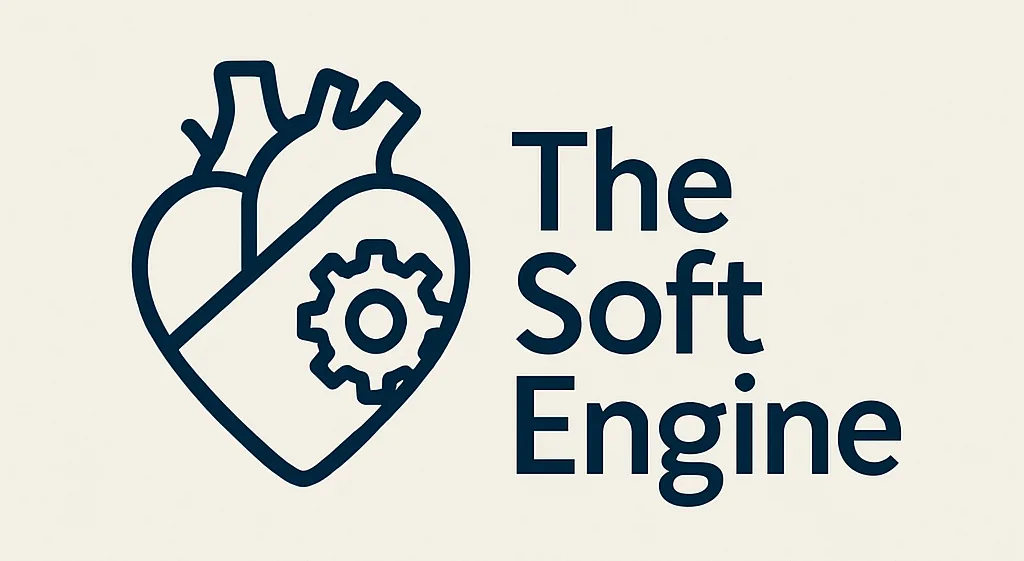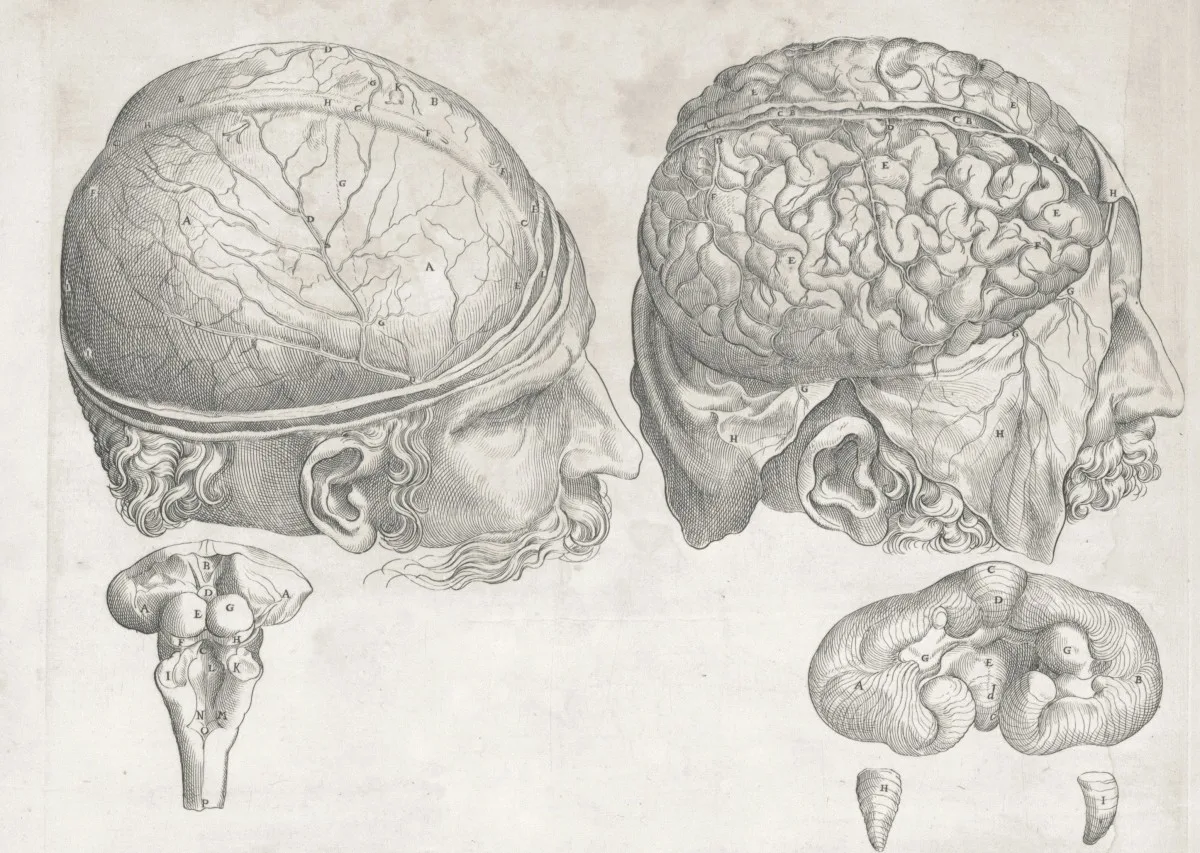Table of Contents
Mental fitness is your brain’s ability to focus, regulate emotions, solve problems, and stay flexible under stress. In other words, it’s how steady and sharp your mind feels when life gets complicated. Think of it as the mental version of cardio and strength training—only instead of lifting weights, your “gym” is your calendar, your habits, and your sleep.
But here’s the question: why put in the effort? Isn’t your mental state something you’re just born with? And can you really train your brain the way you train your body?
In this guide, we’ll unpack the real benefits of mental fitness, why it matters for everyday life, and how to build a weekly plan that sticks. Along the way, you’ll find evidence-backed strategies, tools both free and paid, and honest pros and cons—so you can strengthen your mind with intention, not guesswork.
What Mental Fitness Really Means
Mental fitness is the practice of strengthening your attention, emotional regulation, memory, and cognitive flexibility. It’s not a diagnosis, and it’s not just for elite performers.
It’s for anyone who wants steadier focus, calmer reactions, and smarter decisions—especially when life gets messy. So, basically everyone.
The value of these skills becomes clear in everyday life. Stronger attention means fewer errors at work. Emotional regulation leads to healthier conversations with partners or children.
Cognitive flexibility makes it easier to pivot when projects shift or unexpected challenges appear.
And the stakes are high: in 2019, about 970 million people worldwide were living with a mental disorder, a number that highlights just how important it is to build resilience through daily habits. And, keep in mind, this was before COVID and artificial intelligence.
The science behind mental fitness rests on neuroplasticity—the brain’s ability to rewire itself through repeated actions.
Focused breathing can quiet mental “noise.” Learning a new language strengthens memory. Even small daily practices, done consistently, reinforce useful pathways while weakening unhelpful ones.
Over time, the result is a mind that adapts more easily, reacts with less stress, and makes choices with greater intention.
If that sounds abstract, imagine your brain as a garden.
When you water the plants you want (focus, patience, memory), they grow stronger. When you stop feeding the weeds (distraction and stress spirals), they fade.
The key is small, regular watering. Occasional floods don’t nourish a garden, and they don’t build a resilient mind either.
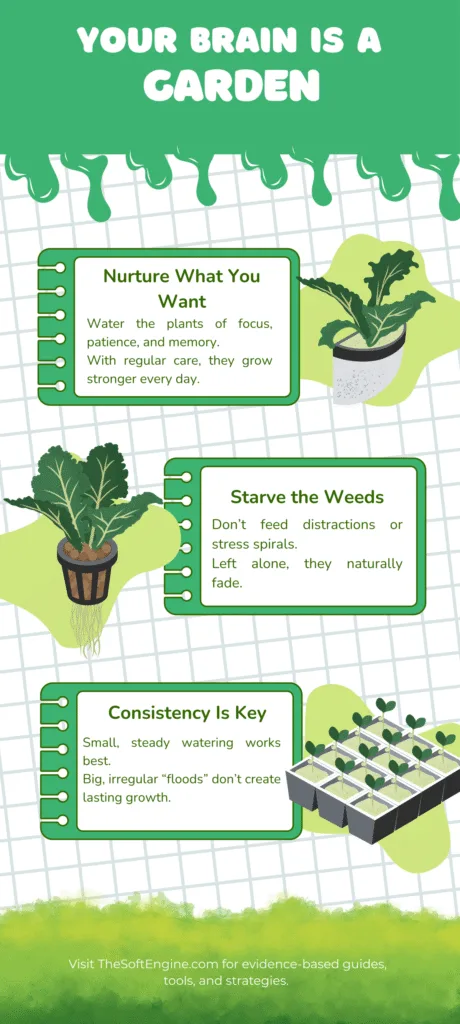
Key Benefits Of Mental Fitness
Mental fitness pays off in many areas of life, from how clearly you think to how well you handle stress. Below are four of the most important mental fitness advantages, each with lasting impact on daily performance and long-term well-being.
1. Sharper Focus
One of the clearest benefits of mental fitness is sharper concentration. When attention systems are trained, the brain becomes better at filtering distractions and prioritizing what matters most.
This leads to cleaner work, stronger learning, and more meaningful conversations, because your mind is less scattered and more present.
The science supports this. Research shows that regular mindfulness practice enhances sustained attention and working memory, while aerobic exercise boosts executive function and processing speed.
Together, these habits illustrate why mental fitness is important not only for productivity but also for building confidence in daily life.
The key takeaway: focus is not a fixed trait. With small, consistent training, anyone can reduce errors, increase efficiency, and think with greater clarity.
2. Resilience Under Stress
Another major mental fitness benefit is resilience under pressure. A mentally fit brain is better equipped to pause, breathe, and choose a measured response instead of spiraling into reactivity. The payoff is significant: steadier energy, deeper sleep, and more consistent performance, even in overwhelming situations.
At the organizational level, the impact is measurable. Depression and anxiety cost the global economy about US $1 trillion every year in lost productivity, and around 15% of working-age adults experience a mental disorder at any time. For individuals, this means that training your mind isn’t a luxury—it’s a protective factor against burnout.
Practical practices like paced breathing, mindfulness, or short breaks are proven to lower stress markers. For example, deep breathing can reduce cortisol levels. Incorporating these routines daily is an accessible way to fortify stress resilience.
3. Improved Mood And Motivation
Mental fitness also plays a central role in emotional well-being. A calmer inner state reduces procrastination, making it easier to start tasks without the mental tug-of-war. Once you begin, motivation builds on itself, fueling progress and creating a reinforcing cycle of action and achievement.
Evidence suggests that mindfulness-based practices can reduce symptoms of anxiety and depression, while physical activity is strongly linked to improved mood and reduced fatigue. This highlights why mental fitness is important for sustaining motivation, not just sparking it.
It’s worth noting that mood improvement doesn’t mean eliminating all stress or sadness. Instead, it creates a more stable baseline, so emotional fluctuations are less disruptive. The result: more consistent energy, higher follow-through on goals, and greater satisfaction in daily routines.
4. Long-Term Cognitive Health
Finally, mental fitness contributes to long-term cognitive vitality. While no single habit can guarantee protection against decline, consistent training helps strengthen neural pathways, support blood flow, and stabilize mood. Together, these factors create conditions that protect thinking, learning, and memory skills across the lifespan.
For example, regular physical activity helps keep judgment and learning sharp and reduces the risk of depression and anxiety. The National Institute on Aging (NIA) notes that combining lifestyle habits—exercise, cognitive training, and sleep—may be more effective than relying on one factor alone.
However, researchers caution that evidence on brain games is mixed, with benefits often limited to the specific skill being practiced.
This nuance matters: the real advantage comes from a balanced approach. Movement, high-quality rest, and ongoing mental challenges work together to preserve cognitive resilience, making them some of the most powerful mental fitness benefits for life.
Why Train Your Mind Like A Muscle
We rarely question the idea that muscles get stronger with training. The brain works the same way. Skills like attention, working memory, and emotional control respond to deliberate practice, and two pillars stand out as especially powerful: movement and mindfulness.
Movement has both immediate and long-term effects. A single workout can reduce anxiety and sharpen thinking. Over time, exercise improves sleep and reduces stress, which indirectly strengthens memory and focus.
The CDC notes these benefits across all age groups, while Harvard clinicians emphasize that exercise improves memory indirectly by enhancing sleep quality and lowering stress levels.
Mindfulness, meanwhile, has earned strong scientific support. In a randomized clinical trial, Mindfulness-Based Stress Reduction (MBSR) was shown to be noninferior to escitalopram, a commonly prescribed SSRI, for treating several anxiety disorders.
That doesn’t mean mindfulness replaces medication for everyone, but it does highlight the power of structured mental training.
If this feels abstract, imagine training your mind like playing piano and jogging.
Piano practice (representing mindfulness and focus drills) improves precision and timing. Jogging (representing movement) strengthens the whole system, making practice easier and recovery quicker. Together, they form a balanced training plan.
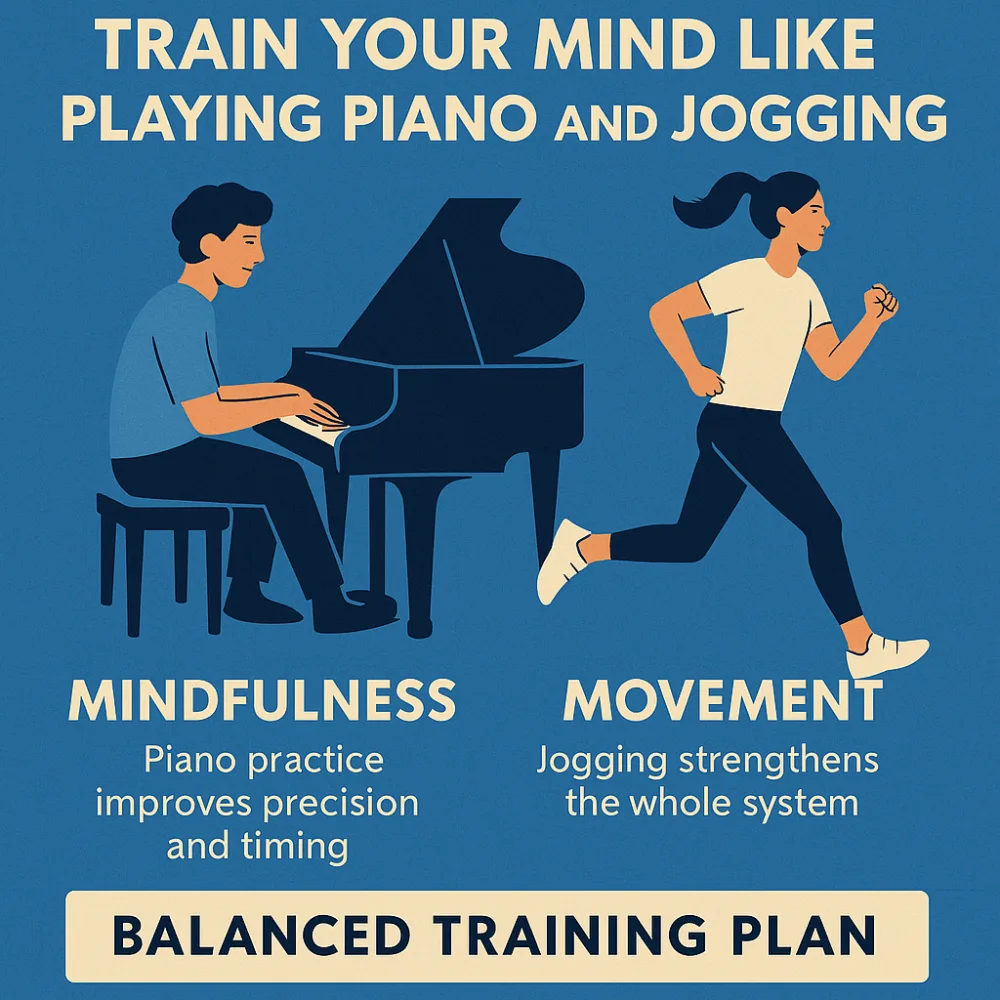
Best Mental Fitness Tools: Paid And Free Options
Below are some of the most effective mental fitness tools (both paid and free) covering focus, mindfulness, and recovery. Each includes use cases, price, differentiators, limitations, and notes on privacy so you can choose what fits best.
Headspace (Paid)
Headspace is one of the most popular apps for guided mindfulness and stress relief. It offers structured courses, quick SOS sessions for stressful moments, and themed packs (like sleep or focus).
Its biggest advantage is polish and accessibility—beginners can dive right in.
On the downside, some users find the content repetitive after several months, and the subscription cost adds up. Data privacy is worth reviewing, as the app collects usage patterns for personalization.
Insight Timer (Free/Budget)
Insight Timer is a strong free option if you want variety without a subscription. It includes a massive meditation library, live classes, and community groups.
Its open, community-driven model makes it uniquely flexible, but quality can vary, and navigation may feel overwhelming.
Public profiles are visible by default, so it’s worth adjusting privacy settings if you prefer to stay anonymous. For those exploring mindfulness on a budget, this is one of the best mental fitness advantages available.
Muse S (Paid Hardware)
Muse S is a wearable EEG headband that provides real-time feedback during meditation and sleep tracking. The immediate biofeedback makes mindfulness practice more tangible—you literally see when your brain calms down.
This can be motivating for beginners who struggle with invisible progress. However, setup can be finicky, and signal quality may vary. Since the device collects sensitive physiological data, it’s important to review policies carefully.
Research supports EEG-based meditation as a promising aid for mental fitness.
Forest (Low-Cost App)
Forest is a gamified focus app where planting a tree represents your deep work session. As you stay focused, your tree grows; leave the app, and it withers. This visual reinforcement makes it fun to sustain attention.
The one-time cost is low, making it budget-friendly. The downside is limited analytics for people who want deeper tracking. Privacy impact is minimal, since it collects little personal data. For those struggling with distractions, it’s one of the simplest tools for mental focus.
Pomofocus (Free Web Timer)
Pomofocus is a free, browser-based Pomodoro timer that requires no login. It’s ideal if you want something fast, distraction-free, and customizable for focus sessions.
Unlike more advanced apps, it lacks robust tracking or reports, but that’s also its strength—it doesn’t demand setup or collect unnecessary personal data. This makes it one of the most accessible digital mental fitness tools for productivity.
Oura Ring Or WHOOP (Paid Wearables)
The Oura Ring and WHOOP are wearables that track sleep and recovery, providing readiness scores to help you time workouts, deep work, or rest. Their main advantage is clarity: you get insights into whether your body and mind are primed for performance.
However, accuracy can vary, and some users develop “sleep score anxiety,” where the data itself increases stress. Since these devices collect detailed biometric data, securing your account and reviewing privacy policies is critical.
Research on sleep trackers suggests they may improve awareness, but benefits differ between individuals.
Pros And Cons Of Popular Approaches
Different approaches to mental fitness work for different people. Each has strengths and drawbacks, and understanding both helps you choose a method that fits your needs. Below are three of the most common strategies, with their key pros and cons.
Mindfulness And Breathwork
Mindfulness and breathwork are portable and well-researched practices. They require no equipment, can be done almost anywhere, and are strongly supported by evidence for improving attention and reducing anxiety.
However, they do have limitations depending on consistency and personal background.
Pros:
- Backed by research showing mindfulness reduces anxiety and improves attention.
- No equipment is required, making it free and accessible.
- Can be practiced in short sessions (even one minute).
- Supports emotional regulation and calm during stressful moments.
Cons:
- Requires regular practice to see lasting results.
- Some people struggle without guided sessions or structured support.
- For individuals with trauma histories, trauma-sensitive guidance is essential.

Cognitive Training And Brain Games
Cognitive training apps and brain games are appealing because they offer quick feedback and gamified progress. They can sharpen targeted skills like processing speed or memory.
However, the evidence for broader life benefits remains mixed.
Pros:
- Provides clear goals, structured challenges, and immediate feedback.
- Can sharpen specific skills such as working memory and attention.
- Gamification adds motivation and habit reinforcement.
Cons:
- Benefits often stay limited to the game itself.
- Transfer to real-world outcomes (like job performance) is inconsistent.
- Evidence for preventing dementia remains uncertain, as noted by the National Institute on Aging.
Physical Exercise As Mental Training
Exercise is one of the most powerful ways to train the brain. A brisk walk, interval workout, or long weekend session can improve mood, support sleep, and strengthen long-term cognitive health. But accessibility challenges mean not everyone benefits equally without adaptation.
Pros:
- Regular physical activity boosts mood, reduces anxiety, and supports long-term brain health.
- Benefits start immediately—one session can reduce short-term stress and sharpen focus.
- Low-cost options (walking, bodyweight training) make it widely accessible.
Cons:
- Scheduling, motivation, and weather can create barriers.
- Risk of injury if intensity increases too quickly.
- Some people feel discouraged if results (better mood, focus) aren’t immediate.
A sustainable starting point: three brisk walks, one short interval session, and one longer session per week.F
Common Pitfalls And Misconceptions
Even with the best intentions, many people misunderstand how mental fitness works. Clearing up these misconceptions can help you avoid wasted effort and build healthier, more sustainable routines.
1. More Intensity Equals More Benefit
A common misconception is that pushing harder automatically creates better results. Mental fitness doesn’t respond well to irregular, heroic efforts.
Instead, small and consistent daily practices (like brief mindfulness sessions or short breaks) create lasting change over time. Apps can certainly help, but they aren’t magic solutions. True progress comes from consistency, not occasional intensity.
2. Sleep Is Flexible
Another pitfall is underestimating the role of sleep. Chronic short sleep blunts attention, slows reaction time, and increases emotional volatility. In fact, more than one in three adults do not get enough rest.
Adults generally need seven or more hours per night, and protecting this sleep window multiplies the benefits of every other mental fitness habit—from focus training to exercise.
3. Toughing It Out Works
Finally, there’s the harmful belief that if you feel low, you should simply “tough it out.” Delaying support often worsens outcomes and makes recovery more difficult.
Reaching out early, whether to a professional, a trusted friend, or a support line, shortens recovery time and prevents deeper spirals. Mental fitness is about building resilience, not enduring unnecessary suffering in silence.
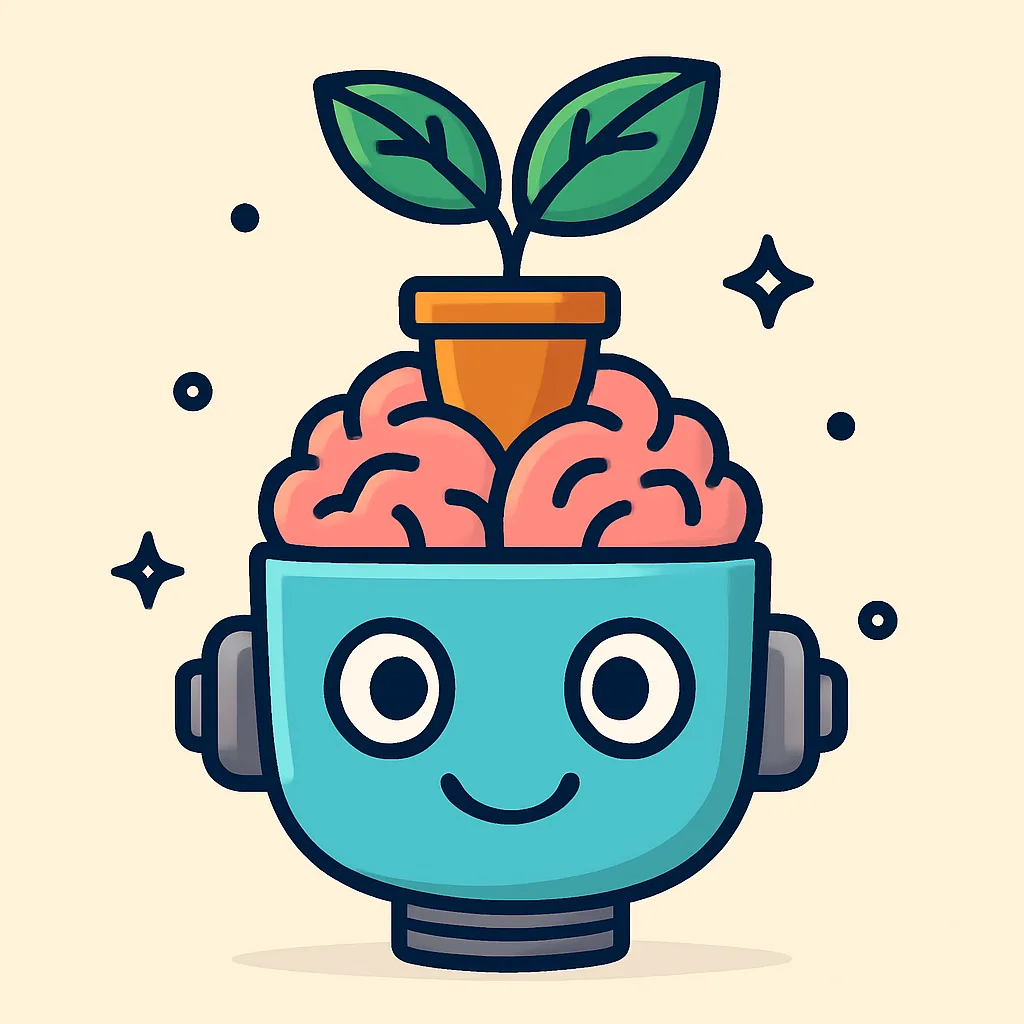
The Future Of Mental Fitness
The next decade of mental fitness will look very different from today. What is now a personal practice of mindfulness, exercise, and focus tools is evolving into a highly personalized, tech-enabled, and workplace-supported system.
Below are the emerging trends that will shape the future of mental fitness and separate short-lived fads from lasting change.
Personalized Protocols Driven By Biomarkers
Mental fitness plans will increasingly adapt to individual biomarkers like heart rate variability (HRV), sleep timing, and cognitive baselines. Early research suggests that tailoring stress-reduction practices to HRV may improve effectiveness (NIH).
Devices such as the Oura Ring and Apple Watch are already experimenting with these metrics, and future AI coaching may nudge users to meditate, move, or rest at the exact moment their physiology calls for it.
Importantly, experts emphasize that on-device processing (not cloud storage) will be essential for protecting privacy.
Convergence Of Movement, Mindfulness, And Cognitive Training
Future training programs are likely to merge physical, emotional, and cognitive exercises into one seamless flow. Imagine a single 30-minute session that starts with aerobic movement, transitions into a mindfulness practice, and finishes with a memory or task-switching drill.
Clinical programs are already testing this blended approach, combining mindfulness-based interventions with movement therapy to complement medication and psychotherapy. For many, this convergence will make mental fitness feel more holistic and engaging.
Workplace Integration As A Core Strategy
The workplace is poised to become a major driver of mental fitness adoption. With productivity losses from poor mental health estimated at US $1 trillion annually, organizations are beginning to integrate “mental fitness hours” into the workday.
Protected focus blocks, recovery breaks, and access to mindfulness or movement programs will move from perks to strategic retention policies. Companies that invest in mental well-being also see improved performance and reduced turnover—suggesting this shift is both humane and profitable.
The Growing Importance Of Digital Ethics
As wearables and apps collect more sensitive data, the ethical landscape will grow increasingly complex. Questions of data ownership, algorithmic bias, and unintended side effects (like “sleep score anxiety,” where metrics themselves create stress) will dominate the conversation.
For now, the safest move is to choose tools with clear privacy policies and keep the most personal notes offline.
Regulators and advocacy groups are beginning to push for stronger protections, meaning transparency and consent will soon be non-negotiable in the mental fitness market.
Conclusion
Mental fitness isn’t about becoming someone new but about strengthening the mind you already have. Think of it as giving your brain a training plan, the same way you’d care for your body.
Small mental fitness exercises make the difference: a few mindful breaths, a protected deep work block, a brisk walk, or an extra hour of sleep.
Tools and apps can help, but they’re there to support, not overwhelm. Use them only where they make life lighter—when they bring you calmer mornings, clearer focus, or softer evenings with the people you love.
The real power of mental fitness is quiet and steady, building resilience that shows up when you need it most.
The best place to begin? Pick one simple mental fitness exercise today. Take a two-minute pause for your breath. Step outside for a twenty-minute walk. Start small, but start now—and let that first step be the seed of a stronger, steadier mind.
